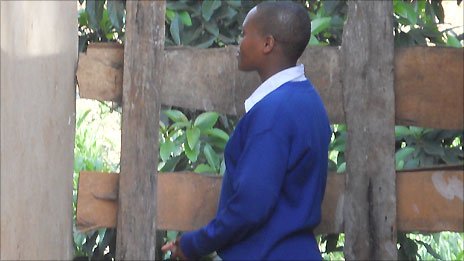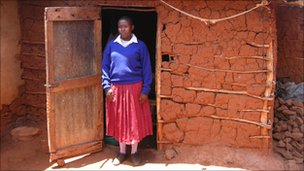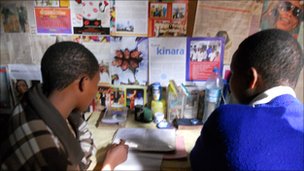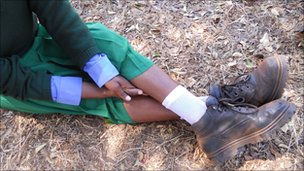BAK
JF-Expert Member
- Feb 11, 2007
- 124,790
- 288,007
4 March 2011 Last updated at 06:04 ET
Tanzanian girls risking rape for an education
By Lizz Pearson BBC News, Arusha, Tanzania

Usta remembers the night that drunken men broke into the mud shack where she lived away from her parents with several other schoolgirls in rural Tanzania.
She had done her homework, but was having trouble sleeping.
"There were seven of them. They forced their way into our huts, and rounded us up outside.
"What they wanted was to rape us," she says.
Start Quote

But this time she and her friends were lucky.
"The men were drunk, so we managed to escape," she says.
It does not always work out that way and Usta's story is becoming increasingly familiar in rural parts of Tanzania where more senior schools have sprung in the last decade.
Many teenage girls who desperately want to finish their education live far from the safety of their villages and parents in huts that the locals call "ghettos".
There they run the risk of attack so they do not have to walk up to 10km (six miles) twice a day to and from school.
In Mbulu district, more than 150km (100 miles) west of Arusha, it is believed there are hundreds of girls living in this dangerous accommodation who are being harassed and - in more extreme cases - raped.

Since 2000, many ghettos have been sprung up to accommodate girls going to senior schools
The cramped earth dwellings are cheap to rent - but they do not get much for their money.
There is no electricity, no water, and no security for the girls living in them.
They have flimsy wooden doors, and as children tend to live in groups together, the areas quickly become known as places where they are alone - and vulnerable.
Inside, girls brighten up the walls with pictures torn from magazines or newspapers.
But though they do their best to make the ghettos feel like home, it is harder to make them feel safe.
They may be frightened but decide to stay because they know that education, for many, is the only way out of future poverty.
School drop-outs
Start Quote
Simon Daffi, from Arusha-based Community Aid and Small Enterprises Consultancy (Casec), says he is concerned about the sexual harassment girls living in the ghettos face.
There are drop-out rates in some schools of up to 20% for girls, mostly aged between 13 and 17, because of pregnancy, he says.
Some head teachers suspect this may also be as a result of rapes, which often go unreported by victims for fear of the stigma.
Mr Daffi believes the problems are partly down to Tanzania's educational success since 2000 - when the country's debts were cancelled allowing it to focus on schooling.
"As a result of an expansion in primary schools, there was increased demand for secondaries. But there were no structures to respond adequately," he says.
More secondary schools were built, one for each ward of five villages in rural areas.
But that meant the schools were not within easy reach of all the children who needed them.
Rented ghettos seemed the best solution.
There have been three rapes in the ghettos near Tumati School, where Usta is a student.

Girls brighten up the walls of the ghettos with pictures torn from magazines or newspapers
None of them has resulted in a conviction, although in two cases, the men were caught.
Usta knew two of the girls who were attacked: Both have left school without their O-level exams.
The rapes have taken away her faith in the local community, and the police. "These drunks know they won't be caught because the nearest police station is 7km away," she says.
"Even if we scream for help, people hardly come to our rescue. By the time the police get here, well... they'll already be finished.
"So the men just do what they want."
Usta has learned to look out for herself. She plans her sleep and study around when the men might "invade".
But her vigilance means she regularly falls asleep in lessons, and her school performance has suffered as a result.
Dormitories
She has already missed a lot of school because her family could not afford the fees and now, aged 20, wonders if she will ever finish her O-level exams.

Some girls, like Usta, fall asleep in lessons because they are too scared to sleep at night
Casec, with funding from a British charity, African Initiatives, has begun an extensive building programme, putting up dormitories in school grounds.
With girls in this safe housing, they hope the pregnancy and drop-out rates will fall.
But in most schools, hostels will not have places for all the girls who need them and progress on building is slow.
That is why Rosie Martin, chief executive of African Initiatives, is ploughing money into Casec's educational work with villagers.
"It's not enough just to build a hostel to keep girls safe. It's this endemic idea that men have rights over women that needs to change," she says.
For Mr Daffi, getting the schoolgirls into hostels cannot come quickly enough.
"In Tanzania, we also have the saying: 'If you educate a woman, you educate the whole nation'," he says.
To hear more about what is being done to help schoolgirls facing sexual harassment in rural Tanzania downnload the BBC's African Perspective, available as a podcast on Saturday 5 March.
Tanzanian girls risking rape for an education
By Lizz Pearson BBC News, Arusha, Tanzania

Usta remembers the night that drunken men broke into the mud shack where she lived away from her parents with several other schoolgirls in rural Tanzania.
She had done her homework, but was having trouble sleeping.
"There were seven of them. They forced their way into our huts, and rounded us up outside.
"What they wanted was to rape us," she says.
Start Quote

Even if we scream for help, people hardly come to our rescue
End Quote Usta
But this time she and her friends were lucky.
"The men were drunk, so we managed to escape," she says.
It does not always work out that way and Usta's story is becoming increasingly familiar in rural parts of Tanzania where more senior schools have sprung in the last decade.
Many teenage girls who desperately want to finish their education live far from the safety of their villages and parents in huts that the locals call "ghettos".
There they run the risk of attack so they do not have to walk up to 10km (six miles) twice a day to and from school.
In Mbulu district, more than 150km (100 miles) west of Arusha, it is believed there are hundreds of girls living in this dangerous accommodation who are being harassed and - in more extreme cases - raped.

Since 2000, many ghettos have been sprung up to accommodate girls going to senior schools
The cramped earth dwellings are cheap to rent - but they do not get much for their money.
There is no electricity, no water, and no security for the girls living in them.
They have flimsy wooden doors, and as children tend to live in groups together, the areas quickly become known as places where they are alone - and vulnerable.
Inside, girls brighten up the walls with pictures torn from magazines or newspapers.
But though they do their best to make the ghettos feel like home, it is harder to make them feel safe.
They may be frightened but decide to stay because they know that education, for many, is the only way out of future poverty.
School drop-outs
Start Quote
As a result of an expansion in primary schools, there was increased demand for secondaries
End Quote Simon Daffi Casec
Simon Daffi, from Arusha-based Community Aid and Small Enterprises Consultancy (Casec), says he is concerned about the sexual harassment girls living in the ghettos face.
There are drop-out rates in some schools of up to 20% for girls, mostly aged between 13 and 17, because of pregnancy, he says.
Some head teachers suspect this may also be as a result of rapes, which often go unreported by victims for fear of the stigma.
Mr Daffi believes the problems are partly down to Tanzania's educational success since 2000 - when the country's debts were cancelled allowing it to focus on schooling.
"As a result of an expansion in primary schools, there was increased demand for secondaries. But there were no structures to respond adequately," he says.
More secondary schools were built, one for each ward of five villages in rural areas.
But that meant the schools were not within easy reach of all the children who needed them.
Rented ghettos seemed the best solution.
There have been three rapes in the ghettos near Tumati School, where Usta is a student.

Girls brighten up the walls of the ghettos with pictures torn from magazines or newspapers
None of them has resulted in a conviction, although in two cases, the men were caught.
Usta knew two of the girls who were attacked: Both have left school without their O-level exams.
The rapes have taken away her faith in the local community, and the police. "These drunks know they won't be caught because the nearest police station is 7km away," she says.
"Even if we scream for help, people hardly come to our rescue. By the time the police get here, well... they'll already be finished.
"So the men just do what they want."
Usta has learned to look out for herself. She plans her sleep and study around when the men might "invade".
But her vigilance means she regularly falls asleep in lessons, and her school performance has suffered as a result.
Dormitories
She has already missed a lot of school because her family could not afford the fees and now, aged 20, wonders if she will ever finish her O-level exams.

Some girls, like Usta, fall asleep in lessons because they are too scared to sleep at night
Casec, with funding from a British charity, African Initiatives, has begun an extensive building programme, putting up dormitories in school grounds.
With girls in this safe housing, they hope the pregnancy and drop-out rates will fall.
But in most schools, hostels will not have places for all the girls who need them and progress on building is slow.
That is why Rosie Martin, chief executive of African Initiatives, is ploughing money into Casec's educational work with villagers.
"It's not enough just to build a hostel to keep girls safe. It's this endemic idea that men have rights over women that needs to change," she says.
For Mr Daffi, getting the schoolgirls into hostels cannot come quickly enough.
"In Tanzania, we also have the saying: 'If you educate a woman, you educate the whole nation'," he says.
To hear more about what is being done to help schoolgirls facing sexual harassment in rural Tanzania downnload the BBC's African Perspective, available as a podcast on Saturday 5 March.